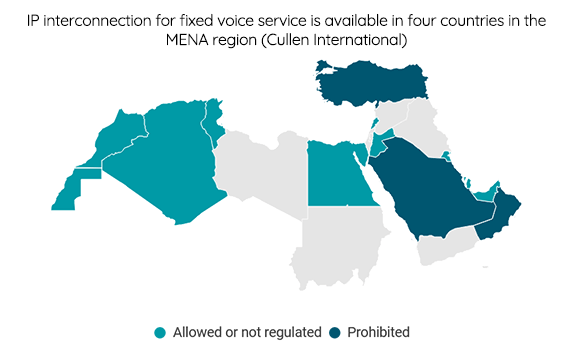Cullen International's new benchmark on "the status of IP interconnection for fixed voice services" covers 13 selected Middle Eastern and North African countries (MENA).
The benchmark shows whether IP interconnection is mandated on fixed operators for terminating fixed voice services, and the availability in practice of IP interconnection.
The benchmark also provides details on any plan(s) to migrate to all IP-based interconnection.

Main Findings
IP interconnection for fixed voice services is available in Oman, Saudi Arabia, Turkey and the United Arab Emirates (UAE).
In the region, only Turkey mandates (on the designated dominant operator) the offering of IP-based interconnection for fixed voice services.
In UAE, all interconnection between the fixed telecoms service providers (Etisalat and du) are based on IP, while the target in Turkey is to have all interconnection IP-based by 1 January 2024.
The telecoms operators in Oman (Omantel and Ooredoo) have a commercial IP interconnection in place, while STC in Saudi Arabia started offering commercial IP interconnection in January 2022.
For more information and to access the full report, please click on “Access the full content” - or on “Request Access”, in case you are not subscribed to our MENA Telecoms service.
more news
07 January 26
Average time to resolve a postal complaint in Europe varies from days to years
Our latest benchmark provides information on how end users' complaints are handled in the European postal sector, including operators' own complaint procedures, escalating procedures and statistics.
19 December 25
CSRD transposition: Belgium, Denmark, Finland and Slovenia transpose the “stop-the-clock” directive
Cullen International’s updated benchmark tracks the progress made by the 27 EU member states in transposing the CSRD and the related “stop-the-clock” directive.
19 December 25
Global trends in AI regulation
Our latest Global Trends benchmark compares policies and regulations on artificial intelligence (AI) across 14 jurisdictions around the world.